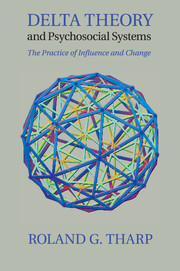Book contents
- Frontmatter
- Contents
- Figures
- Preface
- Acknowledgments
- Section One The Theory of Influence and Change
- 1 Introduction and Overview
- 2 Psychosocial Systems and the Exercise of Influence
- 3 The Zone of Proximal Development, Activity, and Semiotics
- 4 The Means of Influence
- 5 The Organization of Activity
- 6 Unifying the Study of Culture and Psychology
- Section Two The Practice of Influence and Change
- Appendix Criteria, Standards, and Guidelines Necessary for a Unified, Universal Theory
- References
- Index
6 - Unifying the Study of Culture and Psychology
Philosophical and Scientific Issues
Published online by Cambridge University Press: 05 December 2011
- Frontmatter
- Contents
- Figures
- Preface
- Acknowledgments
- Section One The Theory of Influence and Change
- 1 Introduction and Overview
- 2 Psychosocial Systems and the Exercise of Influence
- 3 The Zone of Proximal Development, Activity, and Semiotics
- 4 The Means of Influence
- 5 The Organization of Activity
- 6 Unifying the Study of Culture and Psychology
- Section Two The Practice of Influence and Change
- Appendix Criteria, Standards, and Guidelines Necessary for a Unified, Universal Theory
- References
- Index
Summary
This exposition of Delta Theory has thus far approached the unification of the various contexts of influence and change by recourse to fundamental concepts and processes of biology, psychology, and sociology. A parallel task awaits the challenge of incorporating culture studies into the Delta theoretical structure.
To any unifying ambition, cultural differences bring the most daunting challenge. That awareness came to me through a career’s work in striving to improve human services through specific cultural compatibilities – primarily in education, psycho/behavioral therapies, and applied developmental and community psychology. Where the issue has been examined, cultural elements have been seen to condition the effectiveness of procedures in human influence and change. The working assumption of any universal theory must be that cultural contingency, which is potent and ever present, lays over a deeper unity of Homo sapiens. The theoretical and empirical challenge to the universalist is to find the concepts and dynamics by which cultural variation and species unity articulate.
- Type
- Chapter
- Information
- Delta Theory and Psychosocial SystemsThe Practice of Influence and Change, pp. 59 - 82Publisher: Cambridge University PressPrint publication year: 2011



